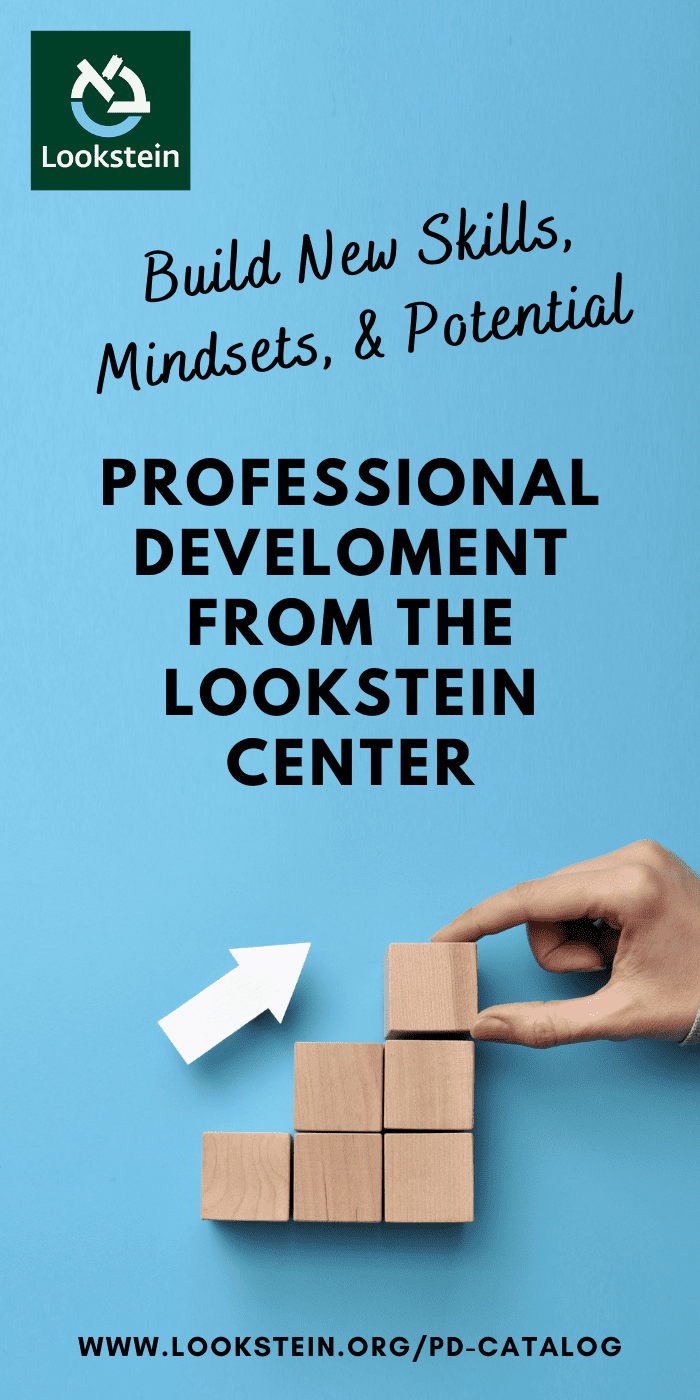It was about five years ago. Within a very short time, I lost my significant other, my home, and my long-time community. You may imagine that losing so much of what defined my life, especially the way it happened, would traumatize me forever. Five years later, I am—with the help of God, my children and friends, and my new community—thriving. I am blessed in my professional work to create meaningful change in Jewish day schools, and I am similarly blessed in my personal life with a rich, robust set of relationships and volunteer opportunities. I share here some methods I used for combatting post-traumatic stress and for building resilience in myself and my children. Everyone experiences stress if not outright trauma, and I hope readers find some helpful insights to help themselves and their students confront tough times.
Two main sources provided me with insight and guidance for coping: lessons learned from my mother, of blessed memory, and lessons from Tanakh, both of which served to help me feel I was standing on solid ground rather than shifting sands during incredibly trying times and beyond.
My Mother, My Model
I pride myself on being a “tough old woman descended from a long line of tough old women.” My mother, along with her own parents, was a Holocaust survivor who girded herself with strength, determination, conviction, and tenacity. Through her own learning she became more religiously observant and pushed herself to earn her first post-high school degree in her 50s. I want to highlight three messages of hers which help shape my search for resilience.
- Embody an attitude of gratitude—always. Each morning since the traumatic events I experienced, I rise with (or before) the sun and realize that once again the sun is rising just as it should, meaning that the world does not stop because of my tragedy. And even though “we are each a universe unto ourselves” (Sanhedrin 37a), we are not the only universe, and our actions in that broader universe are meaningful.
- Make your bed and get dressed every day. No matter what is supposed to happen on a given day, I make my bed, so that it is closed until bedtime. This sets a simple boundary that prevents me from crawling back into it and pulling the covers up over my head, a desire that I experienced often and still occasionally experience. I get dressed and put on makeup, even when I am not planning to go anywhere, to remind myself that I am worth taking care of and that I have what to contribute to this world.
- Never lose your faith or your sense of humor. This refrain has served me well many times throughout the years.
- God takes care of us. The Divine has a grand master plan (which I wish on occasion would be shared with us) and, in my case, clearly provided the refuah (cure) before the makkah (disease). For example, I worked in Pediatric ICUs for 10 years earlier in my life, which taught me to spring into action first and grapple with emotions later, a stance which helped me rebuild my life quickly in a different place. In addition, an extended family member just happened to be closing down an apartment the same week that I moved, and I received furniture from him that I truly needed and would not have had otherwise. I already knew a number of families in my new community, having taught them or their children over the course of 25 years, and they welcomed me warmly. Early on, I would say to God, “I really need a hug,” and would feel the Divine embrace enveloping me with comfort and strength.
- Make space for humor as a tool for coping or emotional release. My mother never lost her sense of humor, even towards the end of her life. Keeping that in mind, my children and I compiled a folder full of the funny things we saw during our period of acute crisis, so that a year later and beyond, we could laugh when we might have succumbed to crying. Even if some of the humor was quite dark, it nonetheless buoyed our spirits and got us through some tough times together.
Tanakh, My Guide
My efforts to cope with trauma also included drawing on a different kind of strength from the deep resources of Tanakh. The spiritual power in Divine instruction, the modeling of biblical characters, and the expression of the religious spirit can all serve as reservoirs of spiritual strength so often necessary and helpful for building resilience.
On the halakhic side, there are important rules governing all interpersonal reactions, which steered my course both in terms of what I expressed in public or held in my heart. Especially central are a number of verses in Leviticus chapter 19, which calls upon us to sanctify and-elevate our lives. There is an absolute prohibition on gossip and slander (v. 16). The Torah does not grant exceptions, such as “unless you really think that you are entitled.” This core legal-ethical rule was my bedrock and still guides me in making no public statements about the cause of my trauma. Similarly, it is forbidden to bear a grudge or take revenge (v. 18). These are not recommendations, but requirements. That does not mean that there is no room for anger, but there is no value in letting the anger own us – we need to acknowledge it, and then move on.
Finally, there is the complex verse 17, “Do not hate your kin in your heart, [rather] reproach your fellow human.” There is an alternative to internally harboring negative feelings, which have the potential to erupt unexpectedly – expressing those feelings in a civil way to the person who provoked them. Let your voice, the one which you want to ultimately represent who you are, be heard in appropriate ways and times. Doing the right thing allows me to sleep well at night, something that is critical for trauma recovery.
The narrative portions of Tanakh, with rich and deep characters, provided a great resource. The opening of Genesis presents three people who are described as having experienced and responded to trauma. Noah saw the entire world, with the exception of those on the ark, destroyed. The trauma of that destruction, not to mention being cloistered with the animals for an entire year, may have provoked his response post-deluge: he planted a vineyard and got rolling drunk to the point that his son, Ham, “uncovered his nakedness.” Lot, too, saw the destruction of his hometown, Sodom, together with all of the residents, fleeing with only his two daughters to the mountains. His reaction, too, was to get so drunk that his daughters lay with him without his knowledge.
Contrasting with those two is the story of Abraham, which offers tremendous inspiration and strength. He leaves his birthplace, twice self-exiles from Canaan due to famine, expels his son, Ishmael, with his mother into the wilderness, and finally, comes close to sacrificing his cherished son, Isaac (who is never seen to speak with him again after this episode) and then returns home to encounter the death of his beloved wife, Sarah. After such a string of traumatic events, what is Abraham’s response? Rabbi J.B. Soloveitchik, in his book Out of the Whirlwind (p. 34), outlines it as such:
“There is no doubt that psychologically Abraham was shattered to the very core of his personality by the death of his beloved wife. Sarah died; Abraham cried. We are not accustomed to seeing tears on our father’s face. He was a strong and courageous personality. Weeping and wailing are prima facie beneath a great man’s dignity. Why did the Torah tell us that Abraham wept? Apparently, it is befitting for a great man to cry like a child. To be insensitive, emotionally unmovable, always cold, neutral and irresponsive is not always the sign of greatness. It is quite often a sign of cruelty, of selfishness and absence of spiritual warmth. The great courageous Abraham did not say a single word when the command to sacrifice Isaac came through to him. He did not collapse and fall on his face in despair and resignation. When coming from a journey, he found his beloved Sarah dead. He mourned the passing of Sarah, cried and wept. Nevertheless, Abraham realized that he could not afford to continue to cry hysterically and wrap himself in the mourner’s mantle forever. People watched him; they observed his conduct in his hour of crisis. The future of the covenantal community was dependent upon his behavior. When disaster struck, he had to demonstrate faith in God and act with fortitude and dignity.”
Abraham confronted his emotions, then laid them aside to take care of what needed to be done for his wife, Sarah. He did not attempt to escape reality, as his two predecessors had done. He also did not run away from his own grief. He felt his grief deeply, and then he moved on to take action.
This is the model to which I look when confronting trauma. We feel, and then we lay down the feelings and take the actions necessary to deal with the trauma.
Another biblical role model, Jacob, taught me the power of prayer. As Jacob prepares for his encounter with Esau—mortally afraid that his brother is still out to get him—he first takes strategic action by splitting his camp into two and sending conciliatory gifts to Esau. But he doesn’t stop there – he turns to God and prays for Divine salvation. Tefillah both connects us with the ultimate source of strength and serves as valuable meditative time, a practice which is highly recommended by therapists who deal with victims of post-traumatic stress.
It is important to recognize that everyone reacts to trauma differently, so that approaches to helping an individual overcome severe stress and build on their resilience need to be individually tailored. Six different women in Tanakh experience infertility – Sarah, Rebecca, Rachel, Manoah’s wife, Hannah, and the Shunamite woman – and each reacts differently; from Rachel who complains, “Give me children, or else I will die,” to the Shunamite woman, who queries the prophet Elisha, “Did I ask for a child?”
Finally, Psalms presents poetry that expresses emotions often better than we can ourselves, which offers us words of comfort and support. One of my favorite sources, to which I turn often, is chapter 34, verse 19, “God is near to the broken hearted, and those crushed in spirit, He delivers.”
We can offer the wisdom and comfort of Tanakh to our students as well, so that they understand that they are not alone in their suffering and that there are always ways to move forward. Many years ago, a 16-year-old student came to me in tears. She had just found out, after much medical testing, that she was actually born without a uterus. Together, we learned the midrash (Yevamot 64b) about Sarah not having a uterus and discussed how much Sarah, even before the miraculous birth of Isaac, had accomplished throughout her life in partnership with Abraham. The student said to me, “I’m still angry at God! How could he have done this to me?” I directed her to Psalm 22, in which the Psalmist “yells” at God, saying, “My God, My God, why have you abandoned me?!” The Psalm goes on to point out that “You [God] drew me from [my mother’s] womb” and it seemed like the right chapter for this student to use to express her own misery. Parenthetically, this student went on to get married, and she and her husband adopted two children.
Reaching Out
All of us, at some time during our personal lives, and at some time during our professional lives as Jewish educators, will need to confront trauma, and help ourselves, our teachers, or our students and their parents deal with it and build the resilience necessary to forge ahead. As unique as every trauma is, it is often helpful to find someone who has been down that road before. When my traumatic event first occurred, I said to my children, “You know how I’ve always said that when something happens, you should turn to someone to whom it has happened before? Well, in our situation, I’m not quite sure if this has happened to anyone else before.”
As such, I make the following offer to anyone who would like to discuss further ways our own intuitions and our Jewish tradition and values can help us cope with trauma. I invite you to reach out to me, and I will do my best to give you guidance and support as you navigate your own personal challenges.

Sharon Freundel
Sharon Freundel was the department chair for TaNaKH (Bible) and Torah SheBa’al Peh (Rabbinics) and the Mashgicha Ruchanit of the Upper School at Berman Hebrew Academy. She then served as Director of Jewish Life at the Milton Gottesman Jewish Day School of the Nation’s Capital and is currently the Managing Director of the Jewish Education Innovation Challenge.





Hi !… The article in amazing and right on point ( as expected) so glad to hear that you are doing well .